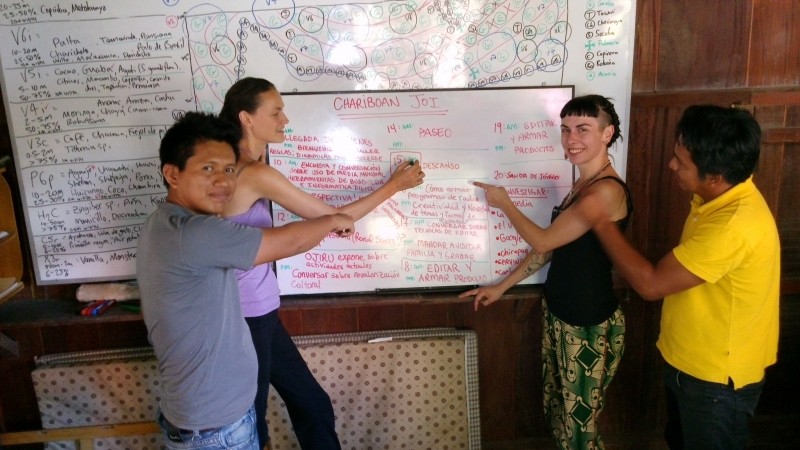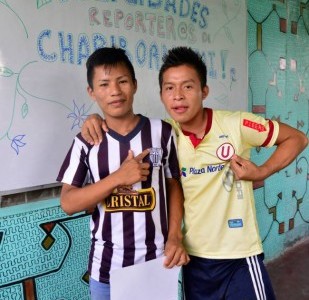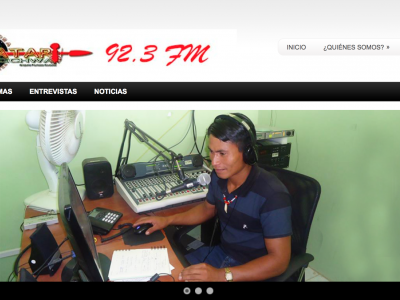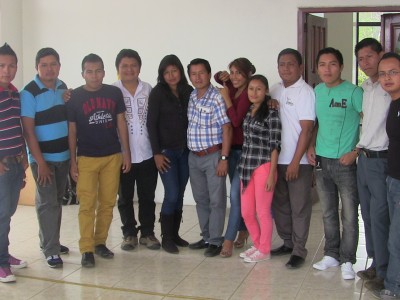
OJIRU and Alianza Arkana members check the workshop program. Image used with permission by the project.
The team of Chariboan Joi is pleased to announce the digital journalism workshop for ten Shipibo youth to be held between February 9 and 20, 2015. The attendees are high school students from the communities Nueva Betania, Alva Castro, Nueva Palestina and Puerto Bethel, chosen from 40 teenagers that were part of the Chariboan Joi Festival that was held December 2, 2014 in Nueva Betania. During that workshop, the budding reporters produced their very first features using mobile phones as journalistic tools. All the documentaries are in Shipibo language and contain tales, stories, chronicles, jokes, and traditional songs.
The audios from the festival have very interesting reflections. Miguel Guimaraes, member of OJIRU who joined the team last January, acknowledges:
A pesar de que hablo y escribo en shipibo, no llego a entender completamente algunas palabras o frases en los mashas (cantos tradicionales) grabados en el Festival. Hay una diferencia generacional en cuanto a vocabulario, los jóvenes han incorporado algunas palabras del idioma de la “sociedad mayor”, pero a la vez estarían perdiendo otras que sólo dominan los mayores.
Although I can speak and write in Shipibo, I am not completely able to understand some words or phrases in the mashas (traditional songs) recorded during the Festival. There is a generational difference regarding vocabulary, young people have added some words to the language of the “older society”, but at the same time they are losing other words that only the elders know.
Meanwhile, Jamer Lopez, chairman of OJIRU expresses:
Traducir literalmente al español puede ser fácil, mas no así interpretar y además redactar de forma entendible.
Translating literally to Spanish may be easy, but it's the same for interpreting and also writing in an understandable way.
At this stage, it produced a debate about the interpretation into Spanish, above all if it should be carried out by professional translators or by OJIRU youth. The decision was made that OJIRU would make the translations, as one of the purposes is to improve their abilites. Besides, that will also result in a reduction of the costs of organizing the event.
The money raised from the translation work was used for the benefit of the organization itself, which had three important tasks pending: organization of a congress, the election assembly and the participation at the XXIV Native Communities Football Tournament, known as the “Shipibo Cup”. Unfortunately, the community lost in the tournament and with that so did the dream of winning the prize, 12,000 soles in cash (a little less than 4,000 US dollars) and 100,000 (about 32,000 US dollars) for infrastructure works.
During the last two weeks, the rooms for the youth have been set up, as well as the classrooms and the wifi connection. Nonetheless, the main task was to prepare the workshop schedule, such as the objectives of the workshop, how to create a foundation based on the current knowledge of the youth, intercultural pedagogy for teenagers, balance between theory and practice, perspectives by the individual who reports and manipulation of information, journalistic ethics, power of the media, etc.
This reflection has made us dream and await that the seed we are sowing will give results in the short-term for a larger citizen power for a new generation more used to digital media and internet. This is exciting, especially for an indigenous community environmentally threatened by the historical and systematic indifference from governments and power groups that yearn for the resources that exist in their territories.
We are looking forwerd to the arrival of the young people from the communities on Monday, February 9.



